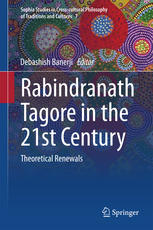

Most ebook files are in PDF format, so you can easily read them using various software such as Foxit Reader or directly on the Google Chrome browser.
Some ebook files are released by publishers in other formats such as .awz, .mobi, .epub, .fb2, etc. You may need to install specific software to read these formats on mobile/PC, such as Calibre.
Please read the tutorial at this link: https://ebookbell.com/faq
We offer FREE conversion to the popular formats you request; however, this may take some time. Therefore, right after payment, please email us, and we will try to provide the service as quickly as possible.
For some exceptional file formats or broken links (if any), please refrain from opening any disputes. Instead, email us first, and we will try to assist within a maximum of 6 hours.
EbookBell Team

4.0
46 reviewsThis critical volume addresses the question of Rabindranath Tagore's relevance for postmodern and postcolonial discourse in the twenty-first century. The volume includes contributions by leading contemporary scholars on Tagore and analyses Tagore's literature, music, theatre, aesthetics, politics and art against contemporary theoretical developments in postcolonial literature and social theory. The authors take up themes as varied as the implications of Tagore’s educational vision for contemporary India; new theoretical interpretations of gender, queer elements, feminism and subalternism in Tagore's literary and social expressions; his language use as a vehicle for a dialogue between positivism, Orientalism and other constructs in the ongoing process of globalization; the nature of the influence of Tagore's music and literature on national and cultural identity formation, particularly in Bengal and Bangladesh; and intersubjectivity and critical modernity in Tagore’s art. This volume opens up a space for Tagore’s critique and his creative innovations in present theoretical engagements.